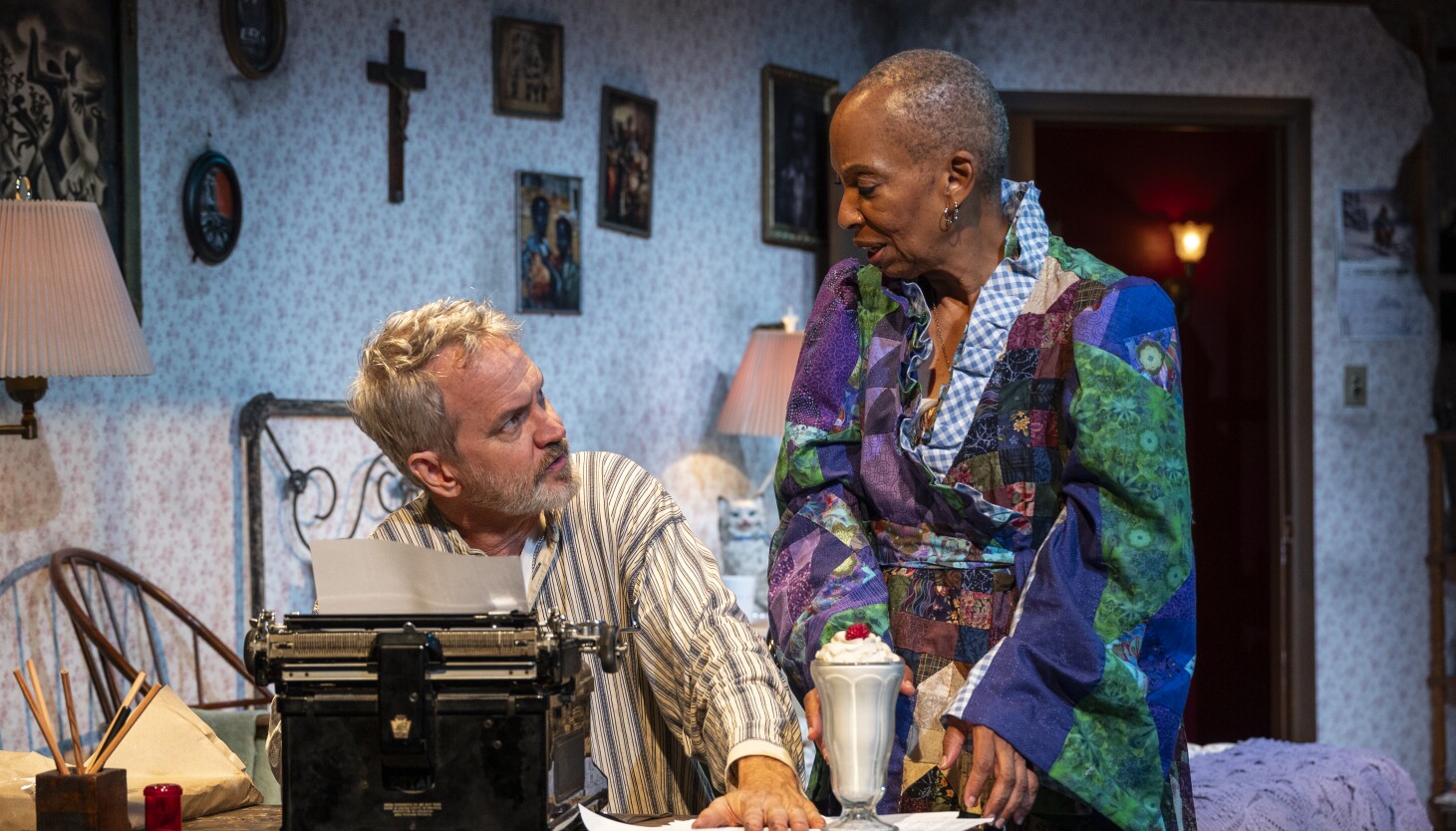It was so much easier to disappear in 1987. Falling (or being pushed) off a grid that didn’t include internet, cell phones, personal GPS or any other electronic footprints made vanishing a simpler matter than it is today. All of which helped make Stephen King’s masterful, ultra-violent psychological 1987 thriller “Misery” terrifying.
Directed by Halena Kays from an adaptation by William Goldman, American Blues Theater’s 90–minute production of “Misery” is suffused with the same sense of suffocating, sinister tension that fuels King’s book (and subsequent Kathy Bates-James Caan movie) until it explodes in a bloodbath denouement fueled by artistic integrity and survival instinct.
The plot follows Paul Sheldon, who totals his car in a snowstorm and is rescued by Annie Wilkes, a fan who initially seems like a heroic Good Samaritan but turns out to be the polar opposite. With the phones down and the roads closed, he has no way of reaching his family, agent or anyone else who might wonder where he is.
As Paul (Steve Key) and Annie (Wandachristine) become locked in a battle of increasingly gory stakes, “Misery” unspools with gruesome impact. True to the book, it’s tough to stomach at times; Nick Sandys’ bone-crunching violence design is wince-inducing. But like an especially ghastly car wreck, it’s tough to look away.
Unlike King’s other early novels (“Carrie,” “The Shining,” “Salem’s Lot”), no supernatural forces are at work in “Misery.” Instead, it explores something even scarier than vampires or haunted hotels: the profound terror regular old mortals inflict on each other.
Set in two rooms, it’s composed primarily of two-person scenes between Annie and Paul, although there’s a late visit by a local cop (Cisco Lopez, whose shocking exit is a heartbreaker).
Paul, unconscious when we first see him, is hooked up to an IV bag hanging off a coat rack. Annie is circling his bed, whispering “I’m your biggest fan” — the book’s opening sentence and most iconic line — in a tone that merges reverence with joy with sinister delusion and lets you know immediately that Kays has a firm handle on King’s classic.
A former nurse (so she says), Annie plies Paul with painkillers as she rapturously describes her relationship with Misery Chastain, the character at the heart of Paul’s best-selling series of soapy romances. A Misery Chastain novel, says Annie with glazed, euphoric eyes staring fixedly at something invisible to everyone else, is “like a visit from my oldest and dearest friend.” Wandachristine’s delivery of the line reveals the profound loneliness of a woman whose best friend doesn’t even exist.
When she blissfully coos “we’re going to be so happy here together,” it’s a reveal: She’s not just lonely, she’s untethered from reality. Annie’s smile becomes increasingly crocodilian as things progress, insisting, with the grin of a true zealot, that she’s just doing the work of the Lord. And that work includes forcing Paul at gunpoint to pen a new Misery Chastain book, something he is loathe to do.
Key summits the play’s challenges with formidable strength. His arc moves from befuddled to grateful to terrified to hell-bent on survival by any means available — pills, knives, fire and psychological manipulation among them.
Paul’s legs are useless, but when, steely-eyed, he starts weight-lifting with a battered typewriter, it’s clear that even with both femurs and tibias shattered, he isn’t going down without a fight. The role is infinitely tricky because it demands Paul convince Annie that her demands are justified and her care heroic while simultaneously letting the audience see he doesn’t mean a damn word of it. Key makes the double meanings apparent with rich clarity.
Also vivid: Paul’s rage and despair at being forced to abandon the manuscript he believes will establish him as a “serious writer” and resurrect Misery Chastain, a character he’s come to despise. His attempt to defy Annie’s brutal creative process forms the heart of the story.
Joe Court’s sound design is a delight. “Moonlight Sonata” plays during a scene of bone-crunching cruelty. The use of the “M*A*S*H” theme underscores one of the most ubiquitous tunes of the era, while crooning love songs and Liberace heighten the menace by contrasting swoony lyrics with carnage.
Shayna Patel’s understated set design clues the audience in immediately to the fact that something is off in Annie’s remote cabin. The decor is off-brand Laura Ashley meets black mold, floral bedspreads, lace curtains and fading family photos framed by peeling wallpaper and an overall sense that there probably roaches scuttling about just out of sight.
You want to see something really scary? Head over to American Blues and witness vintage Stephen King at his finest.

